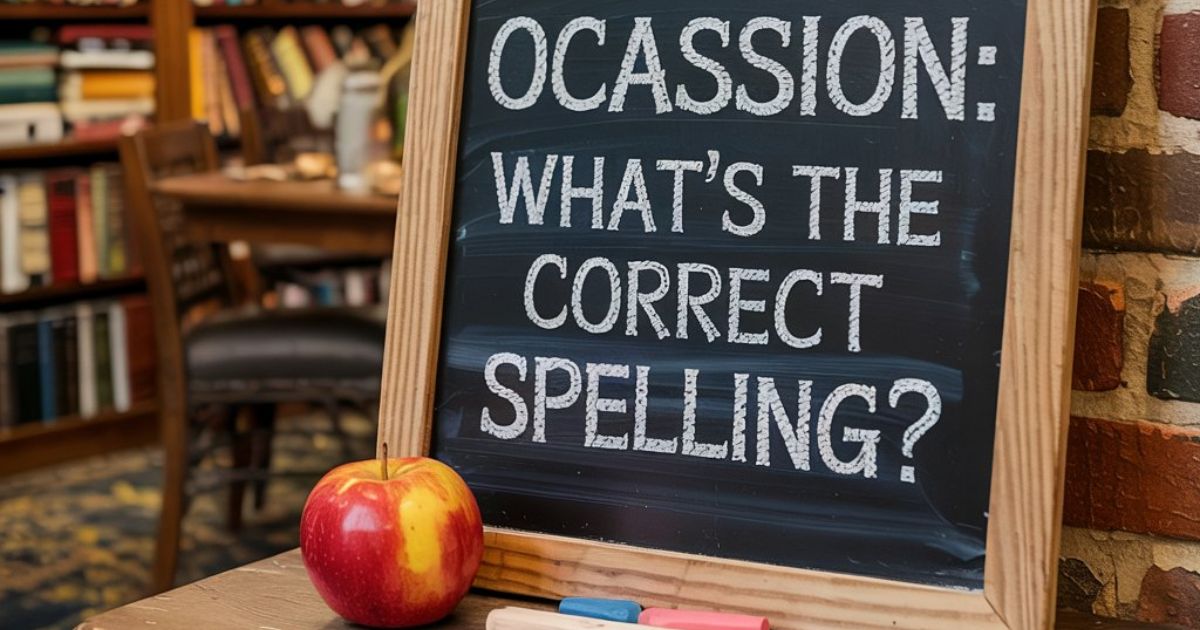The words Occasion or Ocassion are often confused, but only one of them is correct. Occasion is the proper spelling and refers to a special event, opportunity, or moment in time. Many people mistakenly write ocassion, adding an extra “s,” but this is incorrect. Knowing the difference between Occasion or Ocassion can help you avoid common spelling mistakes in your writing. Whether you’re talking about a wedding, a holiday, or a personal achievement, the correct form is always occasion.
In daily life, occasion is used to describe celebrations, milestones, and meaningful events. Ocassion is a frequent misspelling, and using it can make your writing look unprofessional. To keep your writing clear and accurate, always remember to use occasion. Whether you’re celebrating with friends or marking an important moment, make sure you choose the correct spelling of occasion, not Occasion or Ocassion.
Understanding Occasion and Ocassion

When it comes to understanding the spelling of Occasion or Ocassion, it’s important to note the correct form is occasion. The common misspelling, ocassion, is often confused due to its similar pronunciation. While both refer to a special event or a significant happening, the correct spelling for formal writing and general use is always occasion. Using “ocassion” instead of “occasion” can lead to confusion and is considered an error in written communication.
Understanding the difference between occasion and its common misspelling ocassion is key to clear communication. Special occasions or memorable ocassions deserve to be written correctly to ensure professionalism. So, whether you’re referring to an important occasion or a casual gathering, always choose occasion over ocassion to maintain accuracy in your writing. Proper spelling reflects attention to detail, especially when discussing significant ocassions or moments.
Occasion: Definition and Usage
The word occasion is a noun that refers to a special event, moment, or time that holds significance. Many people often mistakenly use the spelling ocassion, but it’s important to remember that the correct form is occasion. This term can describe a variety of events, ranging from personal milestones to formal celebrations, and it also refers to the specific moment something happens or the opportunity to do something.
Here’s a breakdown of its meanings:
- A significant event or celebration: “We celebrated a memorable occasion with our loved ones.”
- A favorable opportunity or specific moment in time: “I took the occasion to express my gratitude.”
- A reason or cause for something: “Her promotion was the occasion for a surprise party.”
- An opportunity or special time for action: “This occasion was perfect for making important decisions.”
- A particular event or milestone in life: “His retirement marked a significant occasion in his career.”
Usage Examples of Occasion
- “Their wedding was a beautiful occasion.”
- “We made the most of every occasion to catch up with friends.”
- “This occasion calls for a celebration like no other.”
- “On this special occasion, we shared our happiest memories.”
- “She cherished every ocassion when her family came together.”
By understanding the correct usage of occasion and avoiding the common misspelling ocassion, you can ensure that your writing is both clear and professional. Additionally, when discussing important ocassions in life, always remember to use occasion for accuracy and clarity. Whether it’s a wedding, a birthday, or any significant moment, the word occasion adds importance and context to your writing.
Idioms and Phrases with Occasion
The word occasion is often used in a variety of idiomatic expressions to convey the idea of a significant event, opportunity, or special moment. These idioms and phrases help enrich our language and allow us to describe specific situations with flair. Below are a few common idioms and phrases that incorporate the word occasion:
- Once in a blue moon (on a special occasion)
This phrase refers to something that happens very rarely or on a special occasion.
Example: “We only get to see each other once in a blue moon, so this occasion was really special.” - On occasion
This phrase means occasionally or sometimes, often used to indicate something that doesn’t happen regularly.
Example: “On occasion, I like to treat myself to a nice dinner.” - Make an occasion of (something)
This means to treat something as an important event, to celebrate it in a special way.
Example: “They decided to make an occasion of their anniversary by throwing a big party.” - Seize the occasion
This phrase encourages making the most of an opportunity when it presents itself.
Example: “When the boss asked for volunteers, she seized the occasion and offered her help.”
By understanding these idioms and phrases, you can add depth and richness to your language when talking about special occasions. Whether it’s a rare event or an opportunity to do something meaningful, these expressions in Occasion or Ocassion help convey the significance of the moment.
Ocassion: Definition and Usage
The word occasion is a noun that refers to a special event, moment, or time that carries significance. It can represent a wide range of events, from personal milestones like birthdays to more formal celebrations like weddings. A common mistake people make is spelling it as ocassion, but this is incorrect. The correct spelling is always occasion, and using ocassion can lead to confusion in written communication.
Why is Ocassion Incorrect?
The word ocassion is an incorrect spelling often seen due to the mistaken doubling of the “s.” While occasion is the correct form, ocassion and ocassions are frequent errors in casual writing. It’s crucial to remember the proper spelling when referring to any event, especially in professional or formal contexts. Incorrect usage, such as Occasion or Ocassion, can make your writing appear less polished.
Example of the Incorrect Usage
- Incorrect: “This was a special ocassion for the family.”
- Correct: “This was a special occasion for the family.”
In this example, the word ocassion should be corrected to occasion. The use of ocassion instead of occasion can detract from the clarity and professionalism of your writing. Similarly, ocassions is another common misspelling, so it’s best to stick with the proper form, occasions, to maintain accuracy.
Understanding the proper spelling of occasion and avoiding errors like ocassion and ocassions will help you communicate more effectively. Whether you’re describing a special occasion, a rare ocassion, or celebrating important ocassions, proper spelling ensures your message is clear and credible.
Side-by-Side Comparison
Here’s a side-by-side comparison of the correct spelling occasion and the common misspelling ocassion, along with their variations like ocassions:
| Word | Correct Spelling | Common Misspelling | Example Sentence |
| Singular | Occasion | Ocassion | “The wedding was a grand occasion that everyone will remember.” |
| Plural | Occasions | Ocassions | “We’ve celebrated many happy ocassions over the years.” |
| Usage | Occasion | Ocassion | “This occasion calls for a special celebration.” |
| Event | Occasion | Ocassion | “His promotion was the perfect occasion for a party.” |
| Moment | Occasion | Ocassion | “That was a rare occasion I’ll never forget.” |
As shown in this table, using the correct form occasion is essential for clear communication, while the misspellings ocassion and ocassions should be avoided. Frequent errors like Occasion or Ocassion can weaken your writing. Whether you’re discussing a special occasion, reflecting on meaningful ocassions, or celebrating an unforgettable occasion, it’s crucial to always use the proper spelling to keep your writing professional and error-free.
Why Is It So Common to Spell Occasion Incorrectly?
The misspelling of occasion as ocassion is a common issue that many people face. There are several reasons why this error occurs frequently, and understanding these reasons can help in avoiding the mistake in your own writing.
Common reasons for misspelling
- Phonetic Similarity
- The pronunciation of occasion often sounds like it should have a double “s.” This leads to the misspelling ocassion rather than occasion.
- The pronunciation of occasion often sounds like it should have a double “s.” This leads to the misspelling ocassion rather than occasion.
- Pattern Recognition
- The double “s” is common in English, so many people mistakenly spell occasion as Occasion or Ocassion based on the pattern of words like possession.
- The double “s” is common in English, so many people mistakenly spell occasion as Occasion or Ocassion based on the pattern of words like possession.
- Fast Typing or Autocorrection
- Fast typing or auto-correction tools can result in typing ocassion instead of occasion.
- Fast typing or auto-correction tools can result in typing ocassion instead of occasion.
- Lack of Attention to Detail
- In casual writing or when typing quickly, the error ocassion may go unnoticed, especially if the writer is not double-checking their work.
- In casual writing or when typing quickly, the error ocassion may go unnoticed, especially if the writer is not double-checking their work.
- Frequent Use of the Error in Casual Writing
- In informal settings, ocassion is frequently used incorrectly. The ease of typing ocassion rather than occasion can make this misspelling more common in casual communication.
- In informal settings, ocassion is frequently used incorrectly. The ease of typing ocassion rather than occasion can make this misspelling more common in casual communication.
By paying attention to these common reasons for misspelling occasion as ocassion, you can avoid this error in your writing. Always double-check your spelling, and remember that occasion is the correct form, not Occasion or Ocassion.
Common Spelling Mistakes
When it comes to spelling occasion, many people make common mistakes, often typing ocassion instead. This frequent misspelling can confuse readers and cause issues in professional writing. Below are the most common errors people make when typing occasion.
- Ocassion – This is the most frequent mistake, where people incorrectly add an extra “s.”
- Ocassions – The plural form is also often misspelled by adding an additional “s.”
- Occassions – Sometimes, people make a double error with an extra “s” in both the singular and plural.
These common spelling mistakes can lead to confusion, especially when people rely on autocorrect or aren’t familiar with the proper spelling.
Key Differences Between “Occasion” and “Ocassion”
It’s essential to understand the difference between Occasion or Ocassion. The main difference lies in the spelling, which can affect the clarity of communication. Here’s a clear comparison between the two words:
- Occasion is the correct form, meaning an event, celebration, or opportunity.
- Ocassion is an incorrect misspelling of occasion, which adds an unnecessary “s.”
- Occasion should be used in both singular and plural contexts (i.e., occasions), while ocassion should be avoided entirely.
By understanding these key differences, you’ll avoid confusion and ensure your writing is clear and accurate.
How to Pronounce “Occasion”
Pronouncing occasion correctly is key to communicating the meaning of this important word. While people might misspell occasion as ocassion, the pronunciation remains the same. Knowing how to say it correctly is important for both writing and speaking.
- The correct pronunciation is “uh-KAY-zhuhn” with emphasis on the second syllable.
- The first syllable is soft, pronounced like “uh.”
- The last syllable is gentle and pronounced like “zhuhn.”
By practicing the correct pronunciation of occasion, you’ll avoid any misunderstandings in conversations and ensure you sound confident when speaking about significant events or opportunities.
Related Guide:
Community’s or Communities’ or Communities? Grammar Guide
How to Remember the Correct Spelling
Spelling occasion correctly is crucial for effective communication, especially since many people commonly misspell it as Occasion or Ocassion. There are simple tricks and techniques that can help you remember the right spelling and avoid this error in your writing.
Memory Tricks
- Break it Down – Think of the word as “oc-ca-sion,” clearly separating the syllables. This way, you’ll always remember there is only one “s” in occasion, not two as in ocassion.
- Visualize the Word – Picture occasion with only one “s.” By visualizing the correct form, you reinforce the proper spelling and avoid writing ocassion by mistake.
- Mnemonic Devices – Use a mnemonic like “Only One S in Occasion Makes It Special.” This phrase can remind you to keep the spelling accurate and prevent confusion with the misspelling ocassion.
These tricks will help you commit the correct spelling of occasion to memory and avoid the common error of writing Occasion or Ocassion.
Occasion in Oxford Dictionary
The Oxford Dictionary is a trusted resource for the correct spelling of words Occasion or Ocassion is like occasion. It confirms that occasion is always spelled with a single “s,” and understanding the official definition and usage will help prevent the mistake of using ocassion.
- Occasion (noun): A significant event or special moment, often associated with celebration or importance.
- Example: “We gathered to celebrate this joyous occasion.”
- Origin: Occasion comes from the Latin word occasio, meaning a favorable opportunity or time.
By referencing the Oxford Dictionary, from Occasion or Ocassion you’ll find that the proper spelling is occasion, and you can confidently avoid the incorrect version, ocassion. This clarity will help you stay consistent and accurate when writing about significant events or occasions.
Synonyms of Occasion
Understanding the correct spelling of occasion is crucial in writing, but it’s also helpful to know its synonyms to enhance your vocabulary. The word occasion has several synonyms, depending on the context in which it’s used. Whether you’re referring to an event, a reason, or an opportunity, these synonyms can be useful alternatives of Occasion or Ocassion.
- Opportunity
- Time
- Episode
- Landmark
- Commemoration
- Gathering
- Festivity
- Situation
- Ceremony
- Cause
- Anniversary
- Date
- Activity
- Affair
- Special event
10 Everyday Usage Examples
The word occasion is commonly used in various contexts, from everyday situations to formal ceremonies. Whether you’re celebrating a milestone or referring to a regular event, understanding how to use occasion correctly is essential. Here are 10 examples about Occasion or Ocassion:
1. Celebrations and Events
- “We gathered for a special occasion to celebrate her promotion at work.”
- “His birthday was a big occasion, with family and friends coming from all over.”
2. Regular Occurrences
- “Every Sunday, we make it a point to enjoy an occasion for family dinner.”
- “The occasion of her weekly yoga class is a time for relaxation.”
3. Formal and Ceremonial Contexts
- “The wedding was an occasion of great importance.”
- “This grand occasion marks the opening of the new art gallery.”
4. Personal Milestones
- “Graduating from college was a momentous occasion in his life.”
- “Their anniversary is always an occasion to remember with love and joy.”
5. Everyday Situations
- “It was an occasion for a cup of tea after a busy day at work.”
- “She used the occasion to express her gratitude to her team.”
6. Family Gatherings
- “Thanksgiving is always an occasion for family to come together.”
- “Christmas is the occasion when we all meet, share stories, and enjoy each other’s company.”
7. Social Gatherings
- “The occasion of his housewarming party was a chance to reconnect with old friends.”
- “We organized a small get-together as an occasion to welcome our new neighbors.”
8. Cultural Celebrations
- “Diwali is an occasion for families to come together and celebrate the festival of lights.”
- “The occasion of the cultural festival attracted thousands of visitors.”
9. Professional Achievements
- “The award ceremony was a great occasion to celebrate their hard work and dedication.”
- “It was an occasion for her to showcase her new project at the conference.”
10. Holiday Observances
- “New Year’s Eve is an occasion for celebration with friends and fireworks.”
- “Easter is a cherished occasion for reflection and spending time with family.”
These examples show how versatile the word occasion can be in everyday life, covering celebrations, personal milestones, professional achievements, and regular gatherings. Remember to use the correct spelling occasion and avoid ocassion.
10 Correct and Incorrect Examples of Occasion or Ocassion

Understanding the correct spelling of occasion is essential to avoid mistakes in your writing. Many people commonly misspell it as ocassion, but knowing the difference can help you use the word correctly. Below are 10 examples demonstrating the correct and incorrect usage of Occasion or Ocassion.
Correct Usage
- “Her wedding was a grand occasion for celebration.”
- “We took the occasion to thank everyone for their support.”
- “This is the perfect occasion to wear my new dress.”
- “His graduation was a memorable occasion.”
- “I met him on the occasion of his birthday party.”
- “The occasion was marked by speeches and cheers.”
- “We celebrated a special occasion with family and friends.”
- “This holiday is an occasion for us to relax and reflect.”
- “The occasion of their engagement was a joyous event.”
- “They gathered for a formal occasion to commemorate the anniversary.”
Incorrect Usage
- “Her wedding was a grand ocassion for celebration.”
- “We took the ocassion to thank everyone for their support.”
- “This is the perfect ocassion to wear my new dress.”
- “His graduation was a memorable ocassion.”
- “I met him on the ocassion of his birthday party.”
- “The ocassion was marked by speeches and cheers.”
- “We celebrated a special ocassion with family and friends.”
- “This holiday is an ocassion for us to relax and reflect.”
- “The ocassion of their engagement was a joyous event.”
- “They gathered for a formal ocassion to commemorate the anniversary.”
In these examples, you can see how the spelling ocassion is a frequent mistake compared to the correct spelling occasion. Using the correct form of occasion in Occasion or Ocassion will help you avoid confusion and ensure your writing remains professional and clear.
FAQ’s
How can I tell the difference between Occasion or Ocassion?
Occasion is the correct spelling. Ocassion is a common mistake that adds an unnecessary “s”. Always use occasion for accurate writing.
Is it okay to use ocassion in formal writing?
No, ocassion is a misspelling. Always opt for Occasion or Ocassion in formal and professional writing to maintain credibility and clarity in your work.
Why do people often write ocassion instead of occasion?
The confusion between Occasion or Ocassion often happens due to the extra “s” sound in the word. Stick with occasion to avoid errors.
How can I remember the correct spelling of occasion?
One trick is to remember that occasion has only one “s.” Repeating it in writing will help reinforce the correct spelling over time.
Does the word occasion refer only to celebrations?
No, Occasion or Ocassion can describe any significant event or moment, not just celebrations. It’s used to talk about important times or occurrences.
Conclusion
The correct spelling is always occasion, not ocassion. Many people mistakenly use ocassion, but this is a common error that can be easily avoided. The word occasion refers to special events, moments, or opportunities that are significant in our lives. Whether you are writing about a birthday, a holiday, or any meaningful event, occasion is the word to use. Miswriting it as Occasion or Ocassion can make your writing look unprofessional.
To sum up, always remember that occasion is the proper spelling. Avoid the mistake of writing Occasion or Ocassion. By using occasion correctly, you will ensure your writing remains accurate and clear. Whether you are talking about celebrations or special moments, the correct term is occasion. So, when in doubt, remember to choose occasion over ocassion for flawless writing.

Ember Rose is a dedicated administrator with 4 years of experience in efficient operations management and team leadership. Skilled in streamlining workflows and enhancing productivity.

